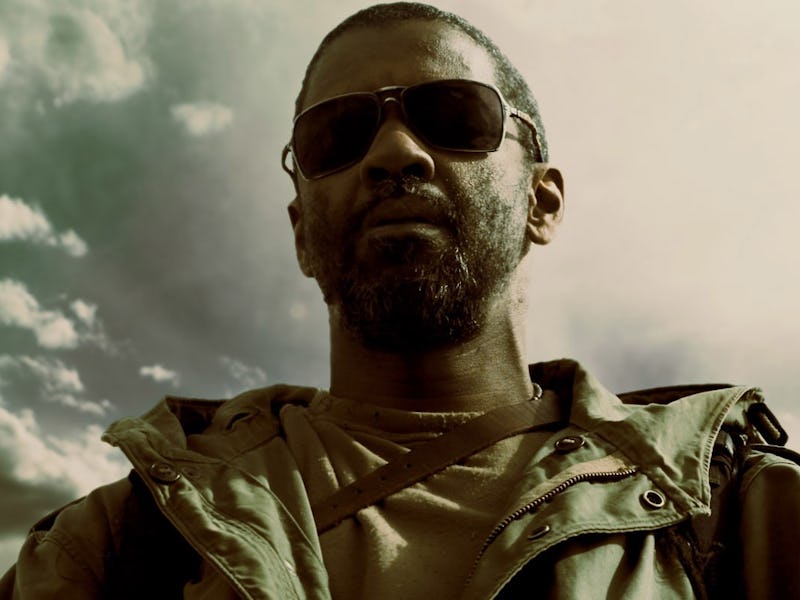You need to watch the best post-apocalypse movie on HBO Max before it leaves this month
This stand-alone classic made its mark before the rise of cinema superheroes.

You’ve seen the image before. A lone wolf roams a desolate land in search of a momentary safe haven. Whether it’s an ancient lawless past or a distant lawless future, it doesn’t matter. There are things that always stay the same, and that is the evil that men do.
While its overtly Christian elements on the surface may turn off a few, this 2010 sci-fi movie is at its heart an agnostic text that stands on its own as a compelling post-apocalyptic neo-western. And it’s the movie you absolutely need to stream on HBO Max before it leaves on July 31.
Written by former video game journalist Gary Whitta (who co-wrote Rogue One: A Star Wars Story) and directed by brothers Albert and Allen Hughes in their final collaboration, The Book of Eli is the story of Eli (Denzel Washington), a hardened survivalist and keeper of a sacred book.
Thirty years after a nuclear war ended the modern world, the former United States is a sand-dusted wasteland where roaming biker gangs and feudal lords dominate a helpless, mostly illiterate populace. In search of water, Eli finds a podunk town run by Carnegie (Gary Oldman), who sends his loyal men to search for a specific book. Inevitably, Eli and Carnegie cross paths when Carnegie learns that not only can Eli fight and read, but the book Eli keeps with him is the very book Carnegie wants as a means to hoard power: the New King James Bible.
But despite the very overt references to Christianity, from Eli’s prayer of grace that Solara (Mila Kunis) imitates, to verbally quoted passages, to even Eli’s namesake (a character in the Books of Samuel, of both the Hebrew Bible and the Christian Old Testament, who was a priest that went nearly blind), The Book of Eli isn’t quite a pro-Christian text. The film’s evocation of Christianity and the existence of the Bible as a cherished plot device is all rather agnostic; it’s a metaphor for dying goodness in a dying world. While it would have been something if The Book of Eli centered on another text, like the Vedas or the Quran (the latter even appears in the film besides a Tanakh at the end), there should be no fear that The Book of Eli is propaganda.
In 2010, io9 pressed the Hughes Brothers on the movie’s religious elements. They confirmed the Bible was present since the script, and their approach to the movie’s religious elements was little more than props and motivations than preached messaging. “We specifically directed a movie to pitch you the way a book, like the Bible, or the Koran, or the Torah, or any sacred words [do],” Allen Hughes told io9. “Whatever you bring into it, that’s what you’re going to come out of it with.” He added: “I think it's very difficult to walk that line.”
Albert Hughes also said: “If you talk about anything sacred, you have [to] handle it right. You can't just go in there and make a movie and be careless about it because you are stepping on people's beliefs. You can't go into something like that being silly about it, no matter what you believe.”
Denzel Washington and Mila Kunis co-star in The Book of Eli, a 2010 post-apocalypse movie streaming on HBO Max until July 31.
Upon its release in 2010, The Book of Eli spawned a discourse centered on its Christian (or non-Christian) identity. The Atlantic aggregated various review headlines that paint a divided response the Hughes Brothers foresaw: “Unequivocally Christian” wrote The New York Post. “Plausibly Christian, But Can Evangelicals Stomach It?” asked The L.A. Times. The resulting mosaic is indeed a movie Hughes imagined, a film that touches on religion (as a metaphor for man’s need for direction and convictions) but seems unwilling to baptize the entire theater.
In a different interview with Film Stage, writer Gary Whitta offered his own succinct take: “Some people say this is a Christian film and I don’t think it is, but clearly it’s a film about faith,” Whitta said. “To have a guy with a Bible in one hand and a machete in the other hand is going to get people talking one way or the other.”
Denzel Washington, as “Eli,” in The Book of Eli.
With styles that recall westerns, samurai chanbara, and post-apocalypse films like Mad Max, there’s more than enough in The Book of Eli to chew on years later, all without starting a theology debate. (But hey, start one. That’s what art is for.) The film’s “plot twist” is enough to warrant second viewings to find clues that give it away, and its exhibition of Filipino Martial Arts (Denzel Washington spent months studying the form under Bruce Lee student Dan Inosanto and Inosanto’s own protégé, Jeff Imada) will appeal to action movie junkies.
Before superhero franchises really took over the box office, original genre movies like The Book of Eli were more commonplace. These movies are now nearly extinct, found only on streamers where they struggle to attract any real attention. However unintentionally, Eli telling Solara that “We had no idea what was precious, [and] what wasn’t” in the pre-apocalypse reads like Eli mulling over the vanished breed of stand-alone cinema.)
Watching Book of Eli now in 2021 is like bearing witness to an elusive stranger walking through hostile territory. It’s stunning how it preaches nothing explicit but puts forth the virtues of faith, and faith alone.
The Book of Eli is streaming on HBO Max until July 31.
This article was originally published on